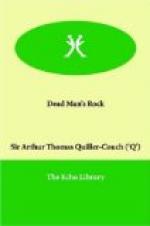“Thomas, do not stare.”
Thomas looked mildly surprised for a moment, and then inquired, “Why not?”
“Does the boy think I’m a wild Indian?” The question was addressed to me, but I could not say, so kept a discreet silence. Thomas relieved me from my difficulty by answering, “No,” thoughtfully.
“Then why stare so? I’m sure I don’t know what boys are made of, nowadays.”
“Slugs and snails and puppy-dogs’ tails,” was the dreamy answer.
“Thomas, how dare you? I should like to catch the person who taught you such nonsense. I’d teach him!”
“It was Uncle Loveday,” remarked the innocent Thomas.
There was an awful pause; which I broke at length by asking to be allowed to go. Aunt Elizabeth saw her way to getting rid of the offender.
“Thomas, you might walk with Jasper over the downs to Lantrig. It will be nice exercise for you.”
“It may be exercise, aunt, but—”
“Do not answer me, but go. Where do you expect little boys will go to, who are always idle?”
“Sleep?” hazarded Thomas.
“Thomas, you shall learn the whole of Dr. Watts’s poem on the sluggard before you go to bed this night.”
At this the boy slowly rose, took his cap, stood before her, and solemnly repeated the whole of that melancholy tale, finishing the last line at the door and gravely bowing himself out. I followed, awestruck, and we set out in silence.
At first, anxiety for my mother possessed all my thoughts, but presently I ventured to congratulate Tom on his performance.
“She has read it to me so often,” replied he, “that I can’t help knowing it. I hate Dr. Watts, and I love to go to sleep. I dream such jolly things. Sleep is ever so much nicer than being awake, isn’t it?”
I wanted sleep, having had but little for two nights, and could therefore agree with him.
“You get such jolly adventures when you dream,” said Tom, reflectively.
I had been rather surfeited with adventures lately, so held my peace.
“Now, real life is so dull. If one could only meet with adventures—”
I caught the sound of wheels behind us, and turned round. We had struck off the downs on to the high road. A light gig with one occupant was approaching us. As it drew near the driver hailed us.
“Hullo! lads, is this the road for Polkimbra?”
The speaker was a short, grizzled, seafaring man, with a kind face and good-humoured mouth. He drove execrably, and pulled his quiet mare right back upon her haunches.
I answered that it was.
“Are you bound for there? Yes? Jump up then. I’ll give you a lift.”
I looked at Tom; he, of course, was ready for anything that would save trouble, so we clambered up beside the stranger.
“There was a wreck there yesterday, I’ve heard,” said he, after we had gone a few yards, “and an inquest, and, by the tale I heard, a lot of lies told.”




